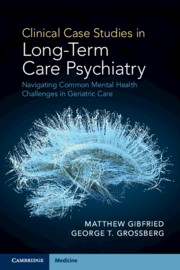 Clinical Case Studies in Long-Term Care Psychiatry
Clinical Case Studies in Long-Term Care Psychiatry Pain Control in MNCD
Published online by Cambridge University Press: 31 October 2024
The implications of unrecognized pain in those with MNCD are far-reaching. Untreated pain can lead to the destabilization of psychiatric conditions such as anxiety, depression, and agitation. Those with cognitive impairments are more likely to have longer waits for the evaluation of pain and receive weaker analgesia.As needed pain medications given to those with MNCD in the LTC setting may depend too heavily on the judgment of those inadequately trained to assess pain. Regularly scheduled pain medications may be a more appropriate option. Always keep the possibility of medication error in the differential diagnosis for apparent changes in mental status. Inadequate pain control negatively impacts mental health in older adults. Those with MNCD with inadequately controlled pain may present with atypical symptoms when compared to those without MNCD. Consider both pharmacologic and nonpharmacologic interventions when formulating a treatment plan for chronic pain in older adults. Opiates may have the best benefit/risk ratio for the treatment of chronic pain in some older adults.
To save this book to your Kindle, first ensure no-reply@cambridge.org is added to your Approved Personal Document E-mail List under your Personal Document Settings on the Manage Your Content and Devices page of your Amazon account. Then enter the ‘name’ part of your Kindle email address below. Find out more about saving to your Kindle.
Note you can select to save to either the @free.kindle.com or @kindle.com variations. ‘@free.kindle.com’ emails are free but can only be saved to your device when it is connected to wi-fi. ‘@kindle.com’ emails can be delivered even when you are not connected to wi-fi, but note that service fees apply.
Find out more about the Kindle Personal Document Service.
To save content items to your account, please confirm that you agree to abide by our usage policies. If this is the first time you use this feature, you will be asked to authorise Cambridge Core to connect with your account. Find out more about saving content to Dropbox.
To save content items to your account, please confirm that you agree to abide by our usage policies. If this is the first time you use this feature, you will be asked to authorise Cambridge Core to connect with your account. Find out more about saving content to Google Drive.